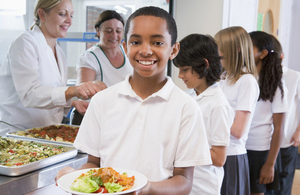Secondary schools win in the Pupil Premium Awards 2015
Schools Minister David Laws announces key stage 4 finalists in the 2015 Pupil Premium Awards.

pupil with a school meal
Schools Minister David Laws today (5 February 2015) congratulated 140 schools across the country awarded with £5,000 each in recognition of the work they have done to improve the attainment of their disadvantaged pupils. The 140 secondary schools have qualified in the 2015 Pupil Premium Awards, following key stage 4 results published last week.
Every school has won at least £5,000 and eligible schools will now be invited to apply for prizes worth up to £250,000. Final prizes will be awarded at a ceremony hosted by Deputy Prime Minister Nick Clegg in March.
The Pupil Premium Awards reward schools that are able to provide evidence of effective strategies to improve the achievement of disadvantaged pupils and show sustained improvement in raising their attainment. The pupil premium is extra funding schools receive for every disadvantaged pupil they teach and is worth £2.5 billion this year alone.
Schools Minister David Laws said:
The pupil premium is building a fairer society with opportunity for everyone.
I would encourage all of the secondary schools which have received a prize to share their successful approach with other schools so they can learn from their experience.
I hope all schools will continue to learn from this excellent practice and ensure they are using their pupil premium effectively, so that they too may be in the running for a prize in 2016.
Schools across England that are doing the most to help disadvantaged pupils improve their achievements in school may be eligible to win a share of £4 million as part of the 2015 Pupil Premium Awards. Thousands of pupils in more than 500 schools could benefit from the awards, which recognise schools that are using their pupil premium in innovative and effective ways.
A further £4 million prize money will also be awarded in the 2016 awards and schools are being encouraged to act now to review what they are doing in their school and ensure they are using the pupil premium effectively - using tools such as the evidence-based Education Endowment Foundation toolkit or by undertaking a pupil premium review.
Notes to editors
- See the full list of KS4 qualifiers
- Read more about the Premium Awards, including eligibility criteria and further details on how to apply.
- Eligible primary and secondary schools were automatically entered for the smaller qualifier awards.
- To go on to win larger regional and national prizes, secondary schools that won £5,000 will be invited to submit further evidence on their use of the pupil premium in their application. Secondary schools are invited to apply for a larger prize if their disadvantaged pupils’ attainment has either improved between 2011 and 2014, or has been consistently high. All schools invited to apply must have good value added measures for their disadvantaged pupils too. The deadline for applications is 18 February 2015.
- Schools without statutory assessment data, including special and infant schools, applied for the regional and national awards by submitting comprehensive evidence on how they have improved the performance of their disadvantaged pupils and have used their pupil premium funding in innovative ways. See the full list of special schools and alternative provision finalists.
- Schools are held accountable for how they spend their pupil premium funding in the following ways: * through the attainment and progress of their eligible pupils * through the comparison between the gap between their eligible and non-eligible pupils and the national gap in performance of these groups * through requiring schools to publish details online of how they spend their funding and its effects each year * through the Ofsted inspection framework
- Read about the Education Endowment Foundation toolkit
DfE media enquiries
Central newsdesk - for journalists 020 7783 8300